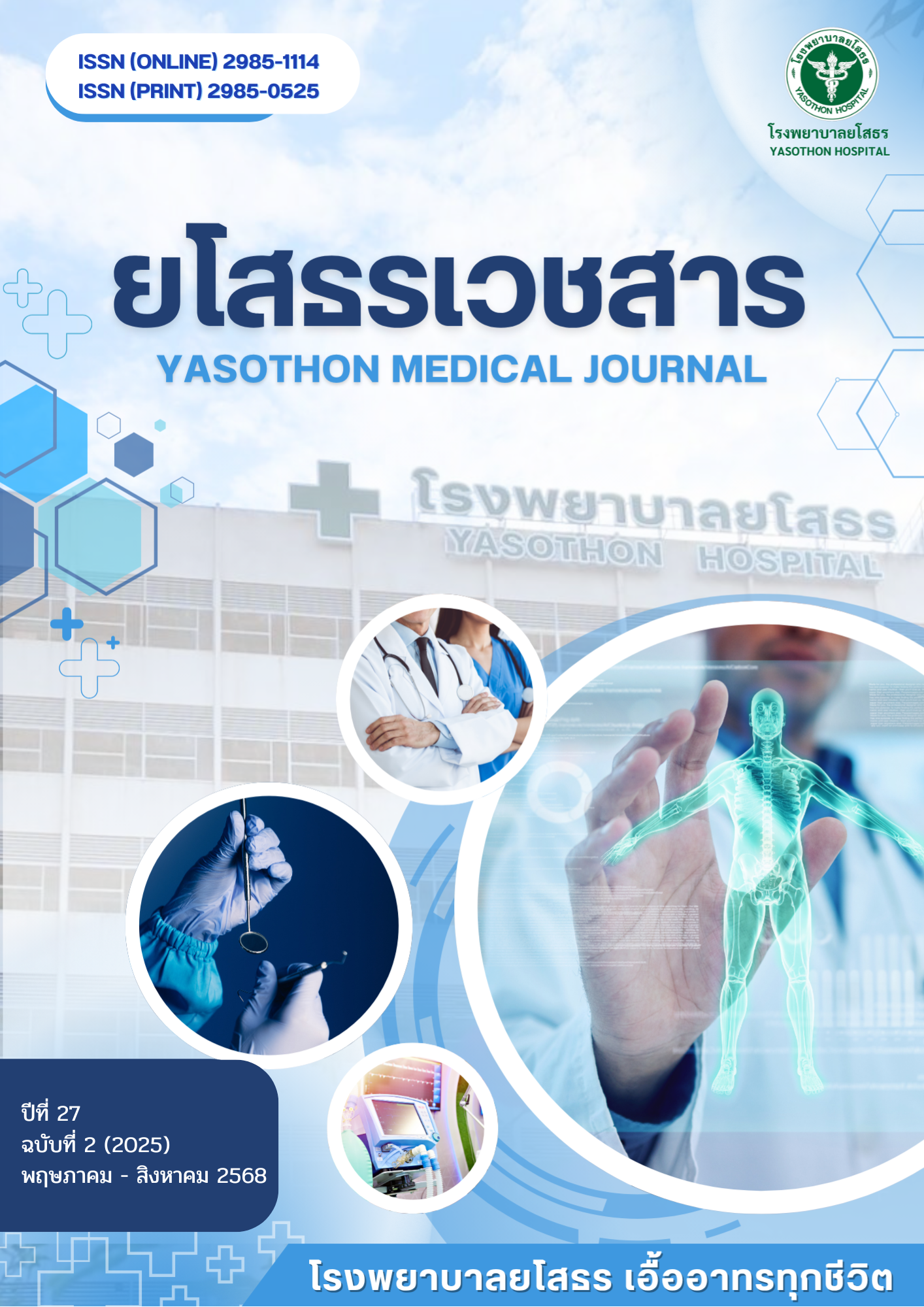The efficacy of the knowledge management program combined on household waste management of people in Krajai Subdistrict, Patio District, Yasothon Province
Keywords:
Knowledge Management, Household Waste Management, Organic Waste BinAbstract
The increasing volume of household waste remains a critical environmental issue, especially in rural communities with limited access to structured waste management systems. This quasi-experimental study evaluated the effectiveness of a knowledge management (KM) program in enhancing household waste management in Krajai Subdistrict, Patio District, Yasothon Province, Thailand. A total of 78 participants were equally assigned to an experimental group and a control group. The KM intervention, conducted over eight weeks, comprised structured knowledge transfer sessions, hands-on demonstrations, distribution of household organic waste bins, and continuous follow-up reinforced with performance-based incentives. Data were collected using validated questionnaires assessing knowledge and behavior regarding organic waste, along with daily waste volume records. Statistical analyses were performed using Paired Samples t-tests and Independent Samples t-tests with a significance level of p < 0.05.
The findings indicated no significant difference in baseline knowledge between the two groups (p = 0.869). However, post-intervention, the experimental group exhibited a statistically significant improvement in both knowledge and behavior scores compared to the control group (p < 0.001) and to their own baseline scores (p < 0.001). Notably, a critical component contributing to the program’s success was the interactive demonstration and practice activity, during which participants constructed and actively used organic waste bins. This hands-on engagement, supplemented by ongoing coaching and recognition incentives, was instrumental in translating knowledge into consistent behavioral change. Moreover, 100% of the experimental group adopted organic waste bins and achieved a substantial reduction in daily waste generation.
This study provides empirical support for the role of community-based KM processes grounded in experiential learning, social reinforcement, and contextual relevance in fostering sustainable waste management behaviors. The intervention model presented here offers a scalable and adaptable framework for similar low-resource settings aiming to promote environmental responsibility at the household level.
Keywords: Knowledge management, Household Waste Management, Organic waste bin
References
กรมควบคุมมลพิษ กองจัดการกากของเสียและสารอันตราย. รายงานสถานการณ์สถานที่กำจัดขยะมูลฝอยของประเทศไทย ปี พ.ศ. 2565. กรุงเทพฯ: กระทรวงทรัพยากรธรรมชาติและสิ่งแวดล้อม; 2566.
Faul F, Erdfelder E, Lang AG, Buchner A. G*Power 3: A flexible statistical power analysis program for the social, behavioral, and biomedical sciences. Behav Res Methods 2007; 39(2):175-91.
doi: 10.3758/bf03193146. PubMed PMID: 17695343.
Cohen J. Statistical power analysis for behavioral sciences. 2nd ed. Hillsdale, NJ: Lawrence Erlbaum Associates; 1988.
ไตรรงค์ ทองนาค. ผลของการเสริมพลังและแรงสนับสนุนทางสังคมในการจัดการขยะของประชาชนในเขตเทศบาลตำบลเมืองขุขันธ์ อำเภอขุขันธ์ จังหวัดศรีสะเกษ. วารสารสุขภาพและสิ่งแวดล้อมศึกษา เมษายน-มิถุนายน 2565; 7(2): 35-44.
ปุญญพัฒน์ ไชยเมล์. การกำหนดขนาดตัวอย่างสำหรับการวิจัยเชิงพรรณนาในงานวิจัยสาธารณสุข. วารสารมหาวิทยาลัยทักษิณ กรกฎาคม-ธันวาคม 2556; 16(2): 9-18.
ธิดารัตน์ สิงห์ทอง. ผลของโปรแกรมส่งเสริมความรอบรู้โภชนาการต่อพฤติกรรมการบริโภคอาหารของนักเรียนชั้นมัธยมศึกษาตอนต้น [วิทยานิพนธ์ปริญญาสาธารณสุขศาสตรมหาบัณฑิต]. สมุทรปราการ: มหาวิทยาลัยธรรมศาสตร์; 2562.
ฉัตรนภา สนองบุญ. ผลของโปรแกรมสร้างแรงจูงใจในการลดปริมาณขยะมูลฝอยครัวเรือน ของประชาชน ตำบลเมืองบางขลัง อำเภอสวรรคโลก จังหวัดสุโขทัย [วิทยานิพนธ์ปริญญาสาธารณสุขศาสตรมหาบัณฑิต]. พิษณุโลก: มหาวิทยาลัยนเรศวร; 2563.
ศศิธร สมพัตร์, วรางคณา จันทร์คง, สิริรัตน์ สุวณิชย์เจริญ. ผลของโปรแกรมการจัดการขยะมูลฝอยตามหลักการ 3Rs ของบ้านแม่แฮเหนือ ตำบลแม่นาจร อำเภอแม่แจ่ม จังหวัดเชียงใหม่. วารสารกฎหมายและนโยบายสาธารณสุข มกราคม-เมษายน 2566; 9(1): 49-63.
ณัฐวุฒิ กกกระโทก, ณฤดี พลูเกษม, วาสนา วิไลนุวัฒน์. ผลของโปรแกรมการพัฒนาความรู้และพฤติกรรมสุขภาพในการจัดการขยะ กรณีศึกษาตำบลหนองหอย อำเภอพระทองคำ จังหวัดนครราชสีมา. วารสารวิชาการมหาวิทยาลัยปทุมธานี มกราคม-มิถุนายม 2565; 14(1): 322-36.
ศราวุฒิ ทับผดุง. ปัจจัยที่มีผลต่อพฤติกรรมการลดปริมาณขยะมูลฝอยครัวเรือนในเขตองค์การบริหารส่วนตำบลที่ไม่มีการบริหารจัดการขยะมูลฝอย อำเภอเมือง จังหวัดพิษณุโลก [วิทยานิพนธ์ปริญญาสาธารณสุขศาสตรมหาบัณฑิต]. พิษณุโลก: มหาวิทยาลัยนเรศวร; 2563.
Downloads
Published
How to Cite
Issue
Section
License
Copyright (c) 2025 YASOTHON MEDICAL JOURNAL

This work is licensed under a Creative Commons Attribution-NonCommercial-NoDerivatives 4.0 International License.
บทความที่ได้รับการตีพิมพ์เป็นลิขสิทธิ์ของยโสธรเวชสาร







